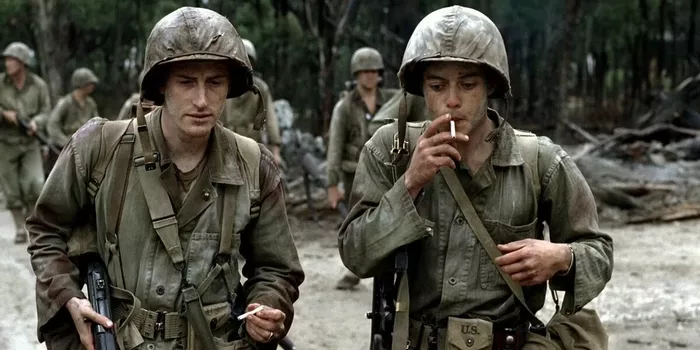“The Pacific,” the gripping World War II miniseries produced by HBO, takes audiences on a journey through the brutal and unforgiving Pacific Theater of the war. In stark contrast to its predecessor, “Band of Brothers,” which focused on the European front, “The Pacific” delves into the harrowing experiences of Marine Corps characters like Robert Leckie. One of the most striking and psychologically significant aspects of Leckie’s character arc in the series is his enuresis diagnosis, shedding light on the mental and physical toll of war. In this article, we explore Leckie’s enuresis diagnosis in “The Pacific” and the traumatic events that led to it.
A Darker Tone and Deeper Exploration
“The Pacific” distinguishes itself from “Band of Brothers” not only in terms of its geographical setting but also in its darker and more intense portrayal of war. While both series are known for their realistic depiction of combat, “The Pacific” delves deeper into the psychological and physical toll endured by soldiers in the Pacific Theater. This shift in focus allows the series to examine the complex and often distressing experiences of Marine Corps soldiers like Robert Leckie.
Leckie’s Enuresis Diagnosis: A Symptom of Trauma
The enuresis diagnosis that Robert Leckie receives in “The Pacific” serves as a powerful and poignant reflection of the trauma he experiences during his service. Enuresis, commonly known as bed-wetting, is a condition characterized by the involuntary release of urine during sleep. In Leckie’s case, this diagnosis is not merely a medical condition but a manifestation of the profound psychological and emotional scars inflicted by war.
The Traumatic Events Leading to Enuresis
To understand the root causes of Leckie’s enuresis, it is essential to delve into the traumatic events depicted in “The Pacific.” Leckie witnesses horrifying and violent deaths on the battlefield, an experience that is enough to haunt even the bravest of soldiers. Furthermore, the relentless rain and squalid conditions during the Battle of Cape Gloucester contribute to the deterioration of his physical and mental well-being. These traumatic experiences form the backdrop against which his enuresis diagnosis unfolds.
Enuresis: A Common Consequence of War
Leckie’s enuresis diagnosis is not an isolated case but a reflection of a broader phenomenon during World War II. Soldiers across various theaters of the war, including the Pacific, experienced enuresis due to the immense stress, trauma, and psychological strain they endured. The conditions in the Pacific Theater were particularly challenging, with soldiers often facing unhealthy environments, lack of adequate supplies, and relentless combat.
The Psychological Impact of Combat
The psychological impact of combat cannot be overstated. War brings with it a level of stress and trauma that is difficult to comprehend for those who have not experienced it firsthand. Soldiers like Leckie were exposed to constant danger, witnessed the deaths of comrades, and faced the uncertainty of survival. These factors can lead to a range of psychological reactions, including enuresis, as the mind and body struggle to cope with the overwhelming stress.
Conclusion: Leckie’s Enuresis in “The Pacific”
In “The Pacific,” Leckie’s enuresis diagnosis serves as a powerful symbol of the physical and psychological toll of war. It highlights the trauma endured by soldiers who faced the brutal realities of combat in the Pacific Theater during World War II. While Leckie’s diagnosis is a fictional representation, it is grounded in the very real experiences of soldiers who grappled with the horrors of war and the profound impact it had on their mental and physical well-being.
“The Pacific” reminds us that the scars of war are not always visible, and the trauma can manifest in unexpected ways. Leckie’s journey, including his enuresis diagnosis, underscores the importance of understanding and addressing the psychological wounds that soldiers carry with them long after the battles have ended. In doing so, the series pays homage to the resilience of those who served in the Pacific Theater and acknowledges the enduring effects of their sacrifice.


